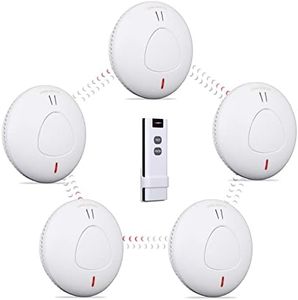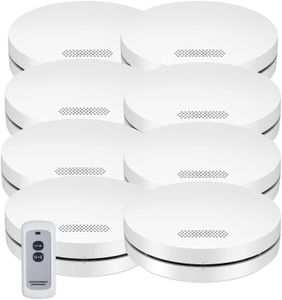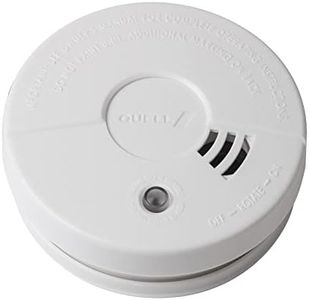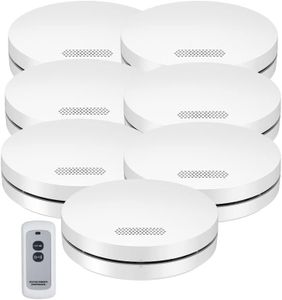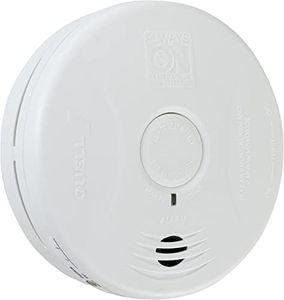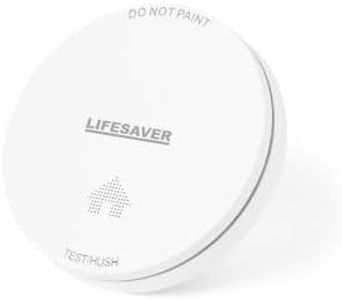We Use CookiesWe use cookies to enhance the security, performance,
functionality and for analytical and promotional activities. By continuing to browse this site you
are agreeing to our privacy policy
10 Best Wireless Smoke Alarms
From leading brands and best sellers available on the web.By clicking on a link to a third party's website, log data is shared with that third party.
Buying Guide for the Best Wireless Smoke Alarms
When choosing a wireless smoke alarm, it's important to focus on finding a device that is reliable, easy to install, and suits the needs of your household or property. Wireless smoke alarms are a great choice because they don't require hard-wiring, making them simple to add or relocate as needed. They also provide the advantage of interconnectivity, where all alarms can sound together when one is triggered, enhancing safety. Ensuring you pick the right model involves considering a few essential specifications and matching them to your home's layout, occupants, and preferences.Sensor TypeThe sensor type determines how the smoke alarm detects fires. The most common types are ionization and photoelectric sensors. Ionization sensors are better at detecting fast-flaming fires, while photoelectric sensors are more responsive to slow, smoldering fires. Some alarms use a combination of both for broader coverage. Consider what kind of fire risk is more common in your environment—kitchens, for example, sometimes trigger more false alarms with ionization sensors. A combination sensor or dual alarms might be best for all-around protection.
InterconnectivityInterconnectivity refers to whether smoke alarms can communicate with each other wirelessly. This is vital in larger homes or buildings, as when one alarm detects smoke, all connected alarms will sound. Systems can vary from basic interconnection between units to smart home integrations that send alerts to your phone. For multi-story or large layouts, interconnectivity ensures everyone is alerted no matter where the danger starts, so choose alarms that support this if your home is not compact or has separate sleeping areas.
Power SourceWireless smoke alarms are typically powered either by replaceable batteries, sealed long-life batteries, or hardwired with battery backup. Replaceable-battery models require you to change the batteries regularly, while sealed units have non-replaceable batteries that last up to 10 years. Hardwired units with a battery backup offer consistent power but are less common in wireless setups. Choose according to your convenience: sealed long-life batteries are low-maintenance, while replaceable batteries are suitable if you prefer regular manual checks.
Alarm VolumeThe loudness of the smoke alarm is a crucial safety feature measured in decibels (dB). A louder alarm (typically around 85 dB at 10 feet) can better ensure sleeping occupants or those far from the alarm are woken by its sound. Consider your home's size and whether family members have hearing impairments when selecting the appropriate alarm volume. For standard homes, typical alarm volumes work well, but larger homes or people with hearing loss may need models with louder or specialized alerts.
Smart FeaturesSome newer smoke alarms offer smart features like mobile notifications, integration with smart home systems, or voice alerts. These can notify you when you're away from home and help specify the type or location of the danger. If you value integration with your home automation or want remote alerts for peace of mind, opt for alarms with these smart features. Otherwise, traditional wireless alarms may suffice if you prefer simplicity.
Test and Silence ControlsThis refers to how easily you can test the alarm to make sure it works and how quickly you can silence it in the event of accidental triggers. Some models have large, easily accessible buttons or even remote silencing via smartphone app. This is particularly helpful in homes where false alarms are likely (like near kitchens) or for users who prefer minimal hassle with maintenance.
CertificationCertification ensures that the alarm meets recognized safety and performance standards, like those from Underwriters Laboratories (UL) or equivalent authorities in your region. Choosing a certified smoke alarm is essential for reliable functioning during an emergency. Always check for proper certifications to confirm the alarm meets necessary safety regulations and isn't just a generic or unregulated device.
